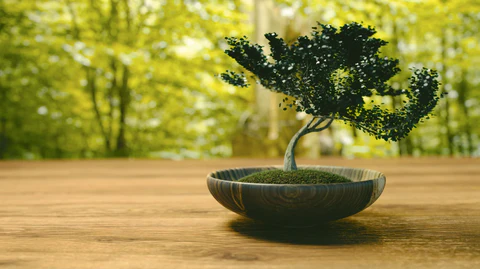Bonsai trees, with their miniature grandeur and unique beauty, have long captivated people across the globe. But have you ever wondered where these tiny trees originated and what they signify in different cultures? Let’s delve into the fascinating history and cultural significance of bonsai trees.
The Roots of Bonsai: Origin in Ancient Cultures
The story of bonsai began over a thousand years ago. While many associate bonsai with Japanese culture, its roots can be traced back to ancient China, known as “penjing.” This ancient art form involved creating miniature landscapes that replicated natural scenery. During the Tang Dynasty (618-907 AD), Penjing became highly popular among the elite, symbolising harmony and balance.
As Buddhism spread from China to Japan around the 6th century, so did the art of miniature trees. The Japanese embraced and refined this art form, transforming it from mere landscape replication to a more focused cultivation of individual trees. This is what we know today as bonsai, a term which literally translates to “planted in a container.”
Bonsai in Japanese Culture: A Symbol of Harmony and Patience
In Japan, bonsai is more than just gardening. It’s an art form representing the harmony between nature, man, and soul. Cultivating bonsai in Japan is steeped in Zen Buddhism, which emphasises patience, mindfulness, and an appreciation for the beauty of the natural world.
The Japanese approach to bonsai also reflects the principles of wabi-sabi, an aesthetic concept that finds beauty in imperfection, simplicity, and impermanence. Each bonsai tree is seen as a living sculpture, where asymmetry and simplicity are valued over perfection.
Bonsai Across the World: From Royal Courts to Modern Homes
From its origins in China and Japan, the art of bonsai began to spread worldwide. In the 17th and 18th centuries, bonsai was introduced to Europe, where it was initially a novelty among the aristocracy. However, it wasn’t until the 19th century that bonsai captured the Western imagination during various world expos and exhibitions.
Today, bonsai is a global phenomenon, with enthusiasts from all walks of life. The universal appeal of bonsai lies in its ability to connect us with nature, even amid urban environments. It offers a sense of peace and tranquillity, a welcome respite from the fast-paced modern world.
Bonsai as a Form of Personal Expression
Bonsai is not just a practice of growing trees; it’s also an avenue for personal expression. Each bonsai artist can impart a piece of themselves into their creation, choosing a style that resonates with their personality. Each bonsai tree tells a unique story from the windswept style that mimics trees in harsh climates to the formal upright style representing balance and strength.
Bonsai and the Modern Lifestyle
In today’s fast-paced world, bonsai offers a much-needed connection to nature and an opportunity for mindfulness. The act of caring for a bonsai – pruning, wiring, watering – requires patience, attention, and a gentle hand. It’s a therapeutic exercise that can help reduce stress and improve mental wellbeing.
Furthermore, in the realm of interior design, bonsai trees are increasingly popular. They add a touch of elegance and serenity to any space, be it a home, office, or public area. The versatility of bonsai makes it a perfect fit for various design aesthetics, from minimalist to rustic.
The Future of Bonsai: Preserving Tradition and Embracing Innovation
As we look to the future, the art of bonsai continues to evolve. New techniques and styles are emerging, and there’s a growing community of bonsai enthusiasts who share their knowledge and experiences online. However, the core principles of bonsai – harmony, balance, and the appreciation of natural beauty – remain unchanged.
There’s also a growing emphasis on sustainability in bonsai cultivation. Enthusiasts and professionals alike are exploring ways to minimise the environmental impact of their practice, from using organic fertilisers to sourcing trees more responsibly.
Final Thoughts: The Timeless Appeal of Bonsai
Bonsai trees, with their rich history and deep cultural significance, offer more than just aesthetic pleasure. They symbolise the interconnectedness of life and nature, teaching us lessons in patience, care, and appreciation of the subtle beauty in the world around us.
Whether you’re an avid gardener, a lover of art, or simply someone seeking a slice of tranquillity, the world of bonsai has something to offer. You can also get bonsai plants online in Gurgaon or wherever you reside and give your space a green, soothing touch.
Bonsai is a tradition that has stood the test of time, continually evolving and enchanting new generations of enthusiasts around the world.
